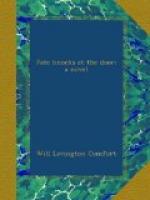And then—the end of campaigning. The rains began gradually that season, so that the last days were steamy and sickening with the heavy sweet of tropical fragrance. Between clouds at night, the stars broke out more than ever brilliant and near, in the washed air. There were moments when the sky appeared ceiled with phosphor, which a misty cloud had just brushed and set to dazzling. Something in the soil made them talk of girls—and Bedient drew forth for Cairns (to see the hem of her garment)—a certain hushed vision named Adelaide.... At last, the Train made Manila, wreck that it was, after majestic service; and the great gray mantle, a sort of moveless twilight, settled down upon Luzon and the archipelago. Within its folds was a mammoth condenser, contracting to drench the land impartially, incessantly, for sixty days or more. And now the fruition of the rice-swamps waxed imperiously; the carabao soaked himself in endless ecstasy; the rock-ribbed gorges of Southern Luzon filled with booming and treachery. Fords were obliterated. Hundreds of little rivers, that had not even left their beds marked upon the land, burst into being like a new kind of swarm; and many like these poured into the Pasig, which swelled, became thick and angry with the drain of the hills, the overflow of the rice-lands, and the filth and fever-stuff of the cities. At last, the constant din of the rain became a part of the silence.
FOURTH CHAPTER
THAT ADELAIDE PASSION
Andrew Bedient did not call at all these Asiatic and insular ports and continue to meet only men. Indeed, he did not fail to encounter those white women who follow men to disrupted places, where blood is upon the ground,—nor those native women inevitably present. A man fallen to the dregs usually finds a woman to keep him company, but it is equally true that man never climbs so high that, looking upward, he may not see a woman there.
A little before the Truxton’s last voyage, the clipper had remained in port for a fortnight at Adelaide, New South Wales. A woman in that city was destined to mean a great deal to the boy of seventeen.... It would be very easy to say that here was a creature whose way is the way of darkness. The striking thing is that Adelaide (in the thoughts of Bedient afterward, she gradually appropriated the name of her city) did not know she was evil.... Such a woman, it is curious to note, has appeared in the boyhood of many men of power and eminent equipment.
Adelaide was small and fragrant. Though formerly married, she was true to her kind in being childless. All her interests were in senses of her own; or in the senses of men and women who fell beneath her eye; pale, narrow temples were hers, but crowded with what sensational memories! A hundred and a few odd pounds, every ounce vivid with health and rhythmic with desire; every thought a kiss loved, missed, or hoped for; a frail little flame that needed only time to destroy an arena of gladiators. Curving, pearly nails with flecks of white in them, a light low laugh, a sweet low voice! Perhaps this was her charm, a sort of samosen tone—low lilting minors that have to do with dusk and gardens and starlight....




